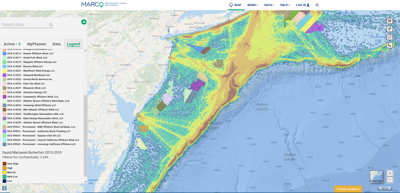The Mid-Atlantic Regional Council on the Ocean (MARCO) will receive $3.9 million through the federal Bipartisan Infrastructure Law for a range of ocean planning and collaborative initiatives, including efforts to determine acidification’s impacts in coastal waters, reduce plastic and other debris in the ocean, and minimize conflicts between offshore wind developments and other ocean users.
Formed in 2009 by the governors of New York, New Jersey, Delaware, Maryland and Virginia, MARCO serves as a partnership for addressing shared regional priorities and providing a collective voice for a healthy ocean. Through its free and publicly accessible Mid-Atlantic Ocean Data Portal (portal.midatlanticocean.org) and engagement by work groups dedicated to specific priorities, MARCO provides ocean data and information to stakeholders, members of the public and decision-makers.
“Regional ocean partnerships like MARCO are uniquely positioned to take on challenges and opportunities that transcend state and other jurisdictional boundaries,” said MARCO Chair Kimberly Cole, environmental program administrator of DNREC. “The projects supported through this funding will ultimately protect and improve our ocean for generations of users.”
The funding is being provided through the National Oceanic & Atmospheric Administration (NOAA) via MARCO’s fiscal sponsor, the Coastal States Stewardship Foundation. It will support work for the next two years in these, among others:
• Ocean and coastal acidification (OCA) — Research will determine hotspot locations in the region that are at high risk or are vulnerable to acidification events, as well as an inventory of OCA monitoring efforts in the Mid-Atlantic. Work will be conducted to increase awareness of OCA by developing educational tools geared toward all ages and hosting information-sharing events for the region’s scientists and practitioners. MARCO will work through the Mid-Atlantic Coastal Acidification Network (MACAN) for these tasks, which MARCO co-coordinates with the Mid-Atlantic Regional Association Coastal and Ocean Observing System (MARACOOS).
• Marine debris — MARCO will develop and implement regional strategies to address priority marine debris types in the Mid-Atlantic. Water refill stations will be provided to communities with waterfront recreation areas to reduce litter from single-use plastic bottles, and there will be a continued focus on using Community Based Social Marketing approaches to prevent marine debris.
• Offshore wind and fishing — MARCO will improve understanding of commercial and recreational fisheries’ interests related to offshore wind projects through focused outreach and engagement. A series of new GIS map products illustrating additional fishing grounds will be created for the Ocean Data Portal.
• Marine life — Guidance and educational materials will be disseminated to reduce harmful encounters between ocean recreation and coastal wildlife. MARCO will continue to update and develop new interactive maps on the portal depicting marine mammal, bird, fish and turtle distributions, including providing additional information about change over time and distributions at different geographic scales which will provide important context for ocean management decisions.
• Improving the ocean planning process — MARCO will expand its capacity to promote engagement and information-sharing on key regional ocean issues among state and federal agencies, tribal entities, the Mid-Atlantic Fishery Management Council, stakeholders and the public. Steps will be taken to improve engagement with underrepresented communities and federally and state recognized Tribes in the five-state region, and better incorporate diversity, equity, inclusion, justice and accessibility principles into the ocean planning process.
NOAA recently announced the awarding of $20.5 million under the Bipartisan Infrastructure Law for projects designed to address regional interstate and intertribal ocean and coastal management issues. Four awards will go to tribal entities, five to the regional associations that represent the Integrated Ocean Observing System and four to regional ocean partnerships, including MARCO.






